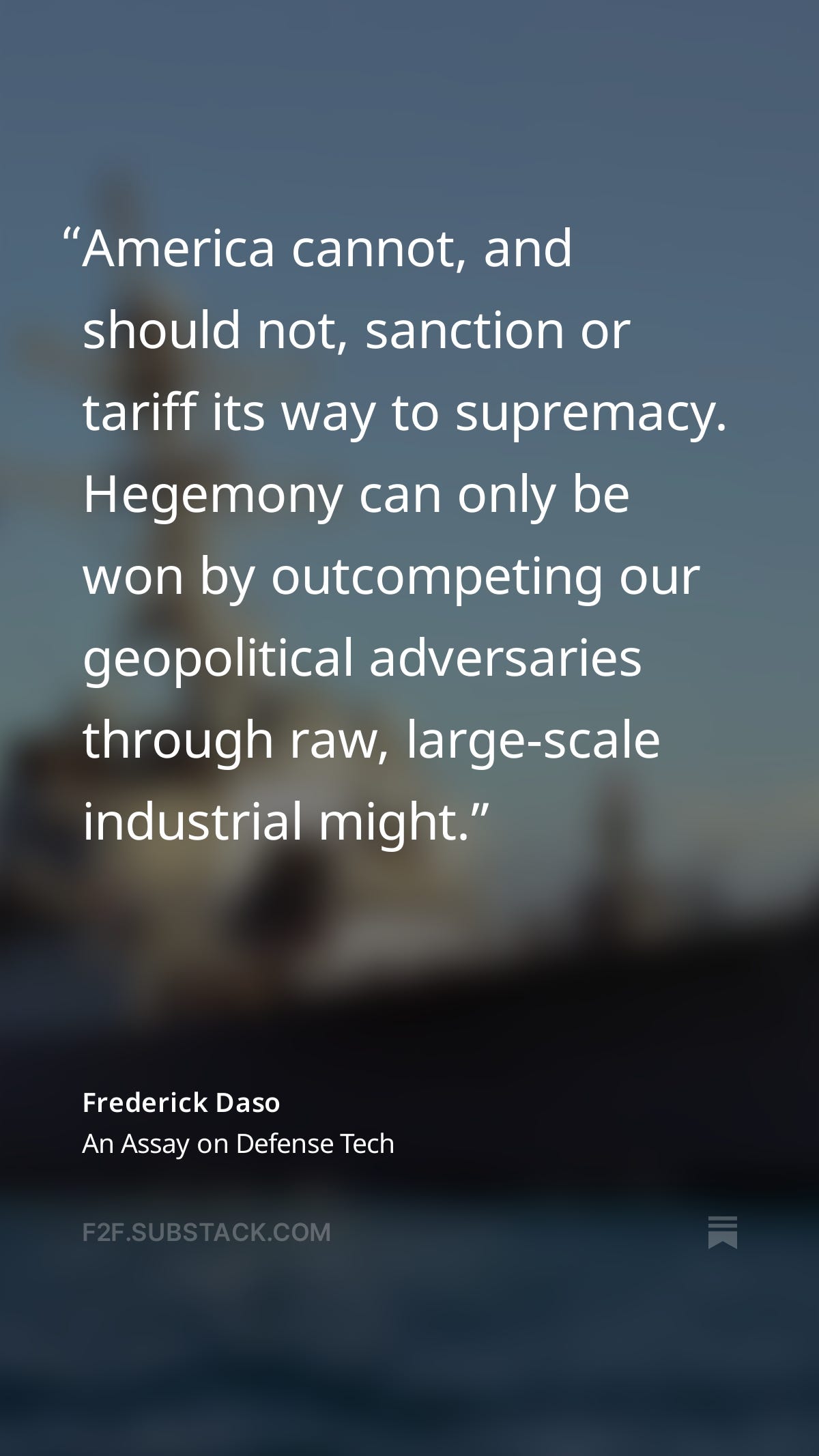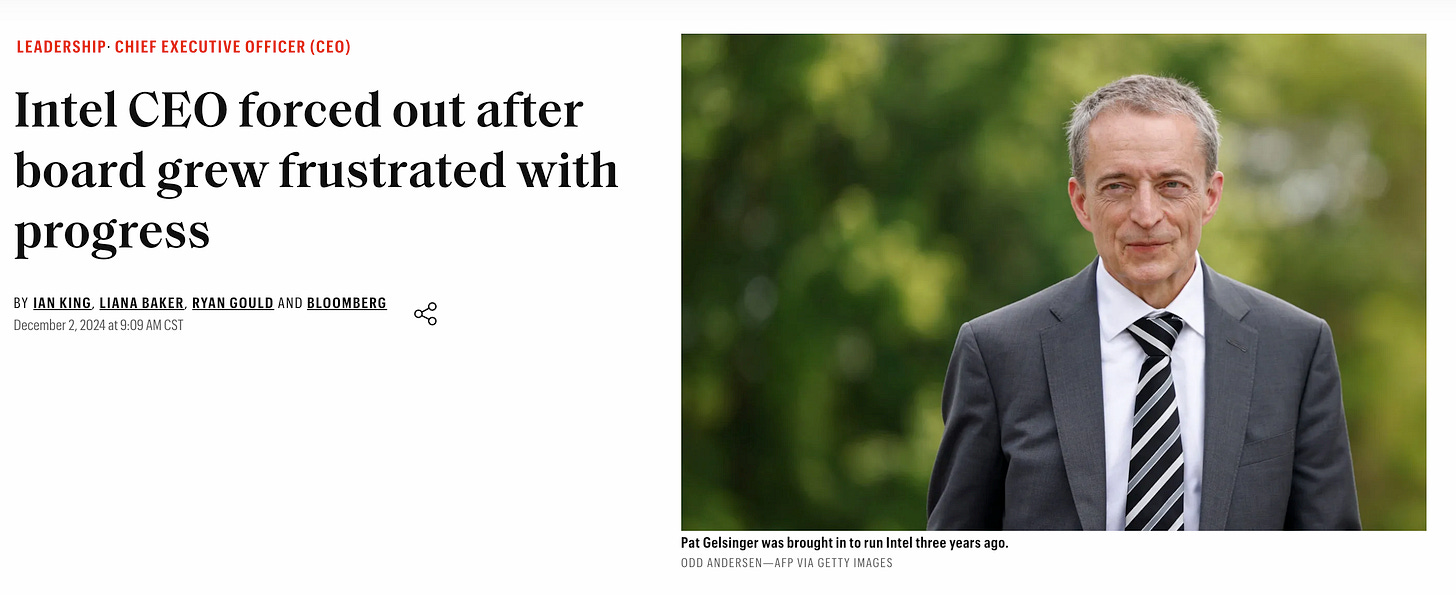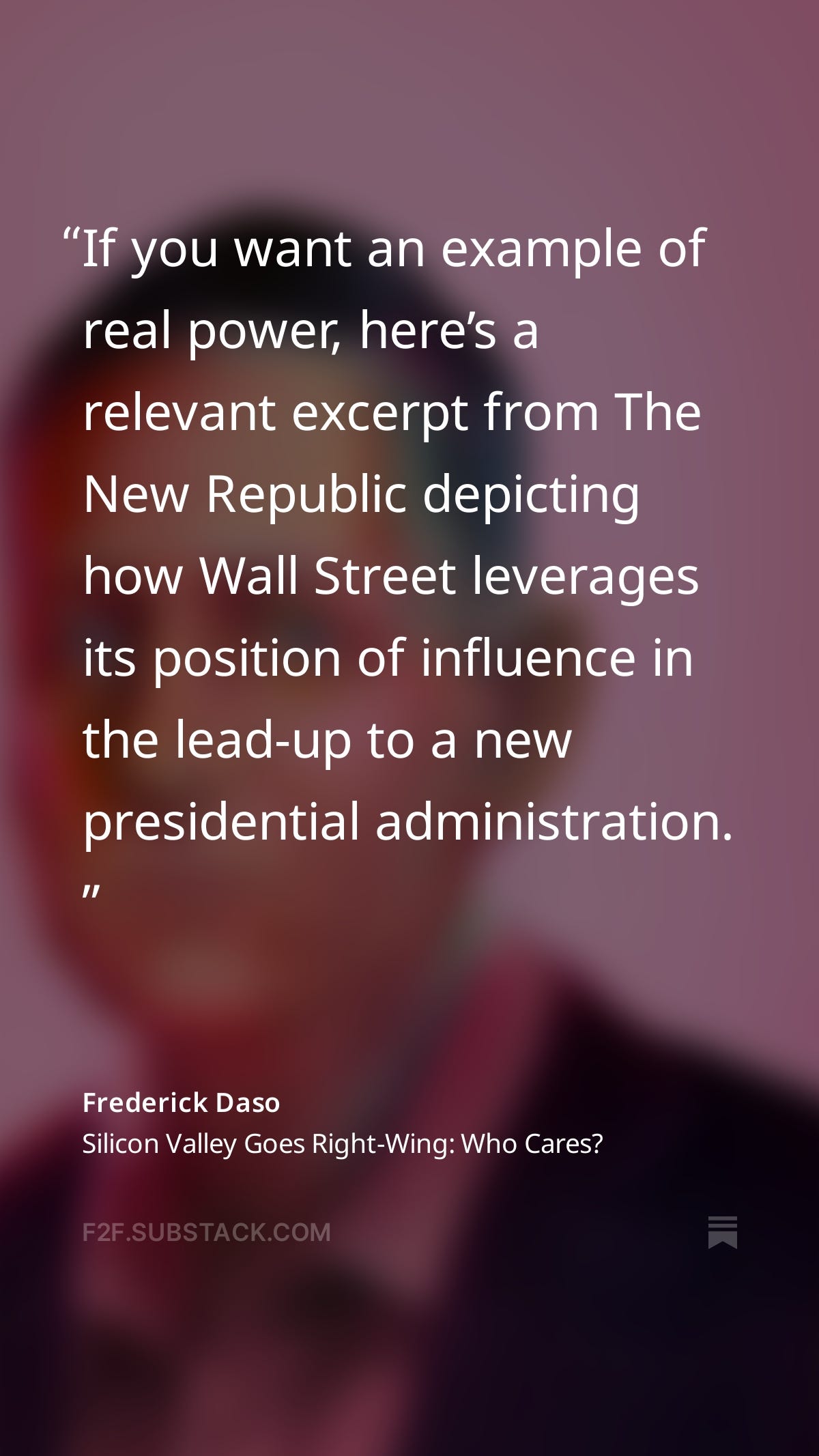I came across this clip that Katherine Boyle, a16z’s American Dynamism visionary, shared on Twitter. The tweet contains a short clip of Palantir co-founder and CEO Alexander Karp speaking at the Reagan National Defense Forum a few weeks ago.
Click on the picture of the tweet to watch the whole clip before reading the rest of the article.
The one thing I love about Silicon Valley elites is that they say the quiet part out loud. They give the game away transparently for all to see.
Karp hasn't said anything new — his approach to American foreign policy is grounded within the realism school of thought. John Mearsheimer is America's most senior practitioner of realism-driven foreign policy.
Mearsheimer defines international relations as existing in an "anarchic world" where there is "no higher authority to adjudicate disputes among states or protect them when threatened." Thus, "all great powers, be they democracies or not, have little choice to compete for power in what is at root a zero-sum game."
Success, in Mearsheimer's eyes, is "to be the most powerful actor of all."
Mearsheimer's perspective is grounded in the liberal tradition of governance and Western political philosophy, best expressed by Thomas Hobbes's seminal work Leviathan. Hobbes defines human beings existing in a state of nature as anarchy, which hopelessly devolves into "bellum omnium contra omnes," or Latin for "a war of all against all."
Karp restates this in a vulgar but direct manner: "Safe means the other person is scared."
Safety, on the personal level, is a zero-sum game, as is security on the geopolitical level.
How do our main foreign adversaries, China, Russia, and Iran, feel about the U.S. as of late?
Are they scared?
Russia
Tucker Carlson recently interviewed with Russia's long-time Foreign Minister, Sergey Lavrov. Lavrov's opening remarks:
"…We would like to have normal relations with all our neighbors, of course, but generally with all countries especially with the great country like the United States. And President Vladimir Putin repeatedly expressed his respect for the American people, for the American history, for the American achievements in the world, and we don't see any reason why Russia and the United States cannot cooperate for the sake of the universe."
China
Chinese President Xi Jinping met with U.S. President Joe Biden and communicated the following to him in Lima, Peru:
"Treat each other as equals. In exchanges between two major countries like China and the United States, neither side can reshape the other according to their own wishes, nor can they suppress the other based on so-called' position of strength,' let alone deprive the other of legitimate development rights to maintain their own leading position."
Iran
Iran made overtures to the West in recent attempts to strike a new nuclear deal in exchange for sanctions relief, which is significant after its strikes against Israel.
Our enemies seem to respect, but not fear, the U.S.
For a guy who "thinks the United States is "very likely" to end up in a three-front war with China, Russia and Iran," it doesn't seem that a fear-based, muscular approach to geopolitics could successfully reestablish deterrence in today's increasingly "multipolar" world.
With the nation's military power in question, what about financial power?
Let's try sanctions and export controls!
“Trying to hold China back is a fool’s errand,” she said in an interview. The $53 billion CHIPS and Science Act, which incentivizes U.S. firms to invest in semiconductor manufacturing and innovate in the sciences of tomorrow, “matters more than export controls.”
Woah! What a stunning admission after four years. Who could have seen that coming?
You know, it's nice to be right. If only I lived in a society that rewarded competency over groupthink.
I digress.
Where does this leave us concerning our American primacist, Mr. Karp?
One thing that I do agree with him on is our need for the tech industry and the state to work closely together. His words in the New York Times:
"A more intimate collaboration between the state and the technology sector, and a closer alignment of vision between the two, will be required if the United States and its allies are to maintain an advantage that will constrain our adversaries over the long term."
He's right on the money. Yet, how has that been going so far?
Here’s how it started:
Here’s how it’s going:
Oof.
Things aren't looking great for Mr. Karp's bold vision.
Yet, I think he and Palantir will still be fine.
It's not much of a prediction to say that the U.S. Government and Silicon Valley will be more coordinated as we advance to rebuild the nation's industrial capacity.
The question is - will such coordination be led by the state or the market?
I'm certain it will be led by the market, in this case, Big Tech and elite startups and VC firms. Why?
It's safe to assume that the most competent folks work in the private sector, not the government. If the opposite were true, someone would have been smart enough to plan for the (likely) scenario that Intel wouldn't meet milestones stipulated by the Commerce Department to unlock the full $7.9B in subsidies that were explicitly earmarked for them in the CHIPS Act.
Second, it's because there's a lot of money (read: profit) at stake for startups and VC firms.
The VCs, once again, say the quiet part out loud (from the WSJ, emphasis added):
Trae Stephens, a partner at the venture capital firm Founders Fund, said investors are turning to defense because of changing dynamics in the startup market. The view of many VCs, he said, is, "You really can't deploy capital into crypto anymore, you really can't deploy capital into e-commerce anymore. Where am I going to deploy capital? Well, there is a recession-proof category, it's defense."
Realistically, a market-led approach to reversing deindustrialization will result in a select number of elite (read: anointed) startups getting the spoils of the $800B+ annual Pentagon defense budget ostensibly opening up under the second Trump administration.
Assuming the above comes to fruition, while this is great for VCs and startups, it will be, at best, a slight-to-moderate positive for the U.S. government. The U.S. will have homegrown hard tech at its disposal, but at higher prices, given that it's unlikely that there will be robust competition against the anointed SV startups that successfully establish a monopoly in their vertical, like SpaceX with orbital launch capability and Palantir with surveillance.
However, the above will not likely happen favorably for Silicon Valley.
Take a closer look at the selection of Stephen Feinberg of Cerebus Capital for Deputy Secretary of Defense over Trae Stephens of Anduril & Founders Fund (per Washington Post, emphasis added):
"O'Hanlon said the Feinberg pick might ease the military establishment's concerns that the next deputy will lean too far in the direction of Silicon Valley, where startups that focus on drones and artificial intelligence have rapidly grown their share of a market long dominated by traditional defense firms such as Lockheed Martin and Boeing."
For those not in the know, here's a short synopsis of the responsibilities of the Deputy Secretary of Defense (emphasis added):
"The deputy secretary of defense oversees the Defense Department's day-to-day business. The primary responsibility is managing the defense budget and executing the priorities of the secretary of defense."
This was a huge, huge miss on Silicon Valley's part. Out of all the roles SV insiders could be selected for in the new administration, this was a must-have, and they came up short. They could have directly controlled the $800B+ annual budget that would have been seamlessly redirected to funding and contracting with defense tech startups.
There is an unspoken but huge schism between Silicon Valley and the Pentagon (and, by extension, Wall Street)!
I have low expectations of the broader Defense Tech trend because of such a missed opportunity. Wall Street still reigns supreme in getting its folks selected from plum positions.
(Click the above picture to be redirected to the article referred to in the quote.)
The last thing I want to say before I wrap up this piece with some major predictions is that I strongly prefer the state-led approach over the market-led approach regarding Defense Technology specifically.
Why? Because it worked, SpaceX was a result of the approach.
"One of the reasons NASA wanted to work with the commercial folks to provide COTS services was NASA would move one step ahead, beyond low-Earth orbit, and then the commercial folks would have an opportunity to fill in the low-Earth orbit services, the first step. Then NASA would do the next step. The long-term goal would be, as NASA kept doing the harder and further out things, then the commercial world would—if it was commercially viable—be able to provide the services because all that technology had been developed, and other companies could take it over. Basically, NASA would do the hard stuff, and the commercial programs would do the routine stuff."
The state (NASA) leads, and the private sector (SpaceX & co.) follows.
It worked.
Today, SpaceX is worth $350B while writing this piece.
With the increasing privatization of launch capabilities, the state-led approach is impossible to implement as more individuals call for the cancellation of NASA's Space Launch System and, more generally, cast serious doubts on the government's ability to conduct long-term planning.
What else can I say?
Time for predictions!
Silicon Valley will be disappointed by the end of Trump's second term, as defense tech startups will still have under 2% of the total spending the Pentagon oversees in government contracts.
Trump's alliance with SV's right-leaning elites will not last for long. The cracks are already starting to show.
Anduril will be the only breakout startup to reach SpaceX's and Palantir's level by the end of the Trump administration.
SV's overall influence relative to Washington and Wall Street will continue to recede.
Merry Christmas and a Happy New Year, my fellow founders!
Soda














